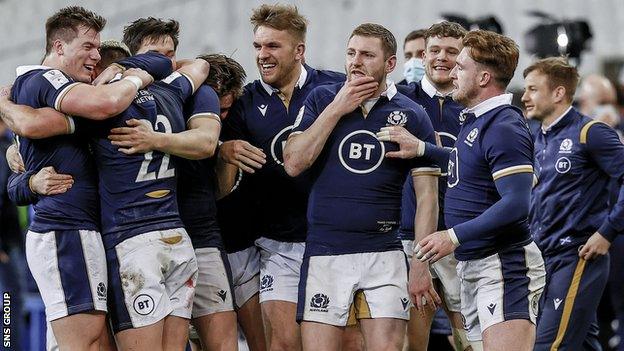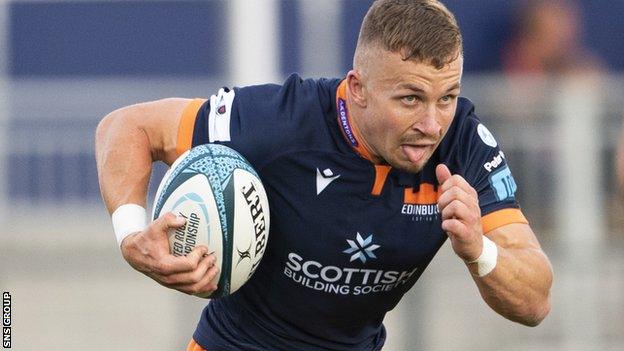Six Nations 2022: Can Scotland build on promise of last year?
- Published

Scotland managed Six Nations wins in Paris and London last year but did not challenge for the title
Here's the brutal reality of championship rugby. Last year Scotland had arguably their best-ever Six Nations - and finished fourth.
They beat England in England for the first time in 38 years and beat France in France for the first time in 22 years. They scored more points (138 compared to a 21-year average of 85) and more tries (18 compared to a 21-year average of seven) than they ever scored in the tournament.
They conceded their third lowest number of points and were joint-best in terms of fewest tries given away and second in terms of tries scored. They won three games and took the other two to the last kick, losing them by a combined total of four points.
And yet, after all the history made and all those statistical highs achieved, Gregor Townsend's team were behind Wales, France and Ireland in the final table.
That stuff about elite sport being a game of tiny margins is a long-running cliche, but that doesn't make it untrue.
On Wednesday, Townsend selects his squad for the 2022 Six Nations, the men who have to build on the stellar work of last season. The days when Scotland were sated by three wins out of five must be over now.
They have never properly contended for the title, never been there on the last day with a realistic chance of winning the thing. Three wins will have to become four for that to happen. That's the next level and, with so few injuries to key men, this is the year to find it.
The bar is high - and why shouldn't it be? Wins over Wales, England, France and Australia in the last few seasons. Away-day monkeys off backs, a dangerous attack and tight defence. Eight Lions, seven Test Lions. The most player depth - ever. One of the most admired coaches in Townsend, one of the most astute defence coaches in Steve Tandy and a respected attack coach AB Zondagh, formerly of the Sharks and Toulouse, joining the ticket.
It's savage, though and the competition is ferocious. Ireland and France have just beaten New Zealand. England have just beaten South Africa, while Wales regularly manage to overcome the awful failure of their club teams by producing something special. They're the reigning champions. Inches will decide this championship.
Townsend's player numbers in his first squad of the year will be in the mid-to-high 30s. This selection is not a punt at reading the coach's mind - good luck with that - but an exploration of his options with a conclusion as to who deserves to feature.
Crowd of centres, heap of hookers, tight at tighthead

Will Edinburgh scrum-half Ben Vellacott win his first cap in this year's tournament?
Full-back: Stuart Hogg. The captain and record try scorer is in fine form, mercifully.
Utility back: Blair Kinghorn. Can play full-back and wing, His position these days is 10. He'd be a reasonable emergency option there.
Wing: Darcy Graham and Duhan van der Merwe are the starters. Sean Maitland is still a serious rugby player. One more required and Rufus McLean looked like the coming man in the autumn but he's disappeared off the radar at Glasgow. Kyle Steyn has the running power, work-rate and versatility. He deserves it.
Centre: This time last year Townsend went with five of them. There are about eight contenders. Chris Harris and Sam Johnson is the Test midfield. Sione Tuipulotu is going well at Glasgow - apart from last Saturday's meltdown against Exeter - and his physical edge could count.
Cam Redpath is only just coming back from injury and should be given time to readjust. But how good it is to see him out there again. Huw Jones isn't playing enough rugby for Harlequins. On form, the two other slots are between Mark Bennett, Matt Scott and James Lang. Bennett and Scott have more to their game than Lang.
Fly-half: Finn Russell, the most joyous artist in Paris since Toulouse-Lautrec. Adam Hastings can cover in the biggest games as he proved last season. Only room for two along with Kinghorn as back-up. Ross Thompson's time will come.
Scrum-half: Ali Price, George Horne and Ben Vellacott. Horne hasn't been at his best and Jamie Dobie is pushing hard, but Horne knows what Six Nations rugby is all about. Vellacott has been dynamite for Edinburgh and should be every inch a Townsend scrum-half.
Loosehead: Rory Sutherland is free to play after his red card for his club. Pierre Schoeman and Jamie Bhatti, now ahead of Oli Kebble at Glasgow, should be the other two. Not a lot wrong with that.
Hooker: There are five vying for three - maximum four - spots. George Turner is number one now. Stuart McInally makes it. That leaves Ewan Ashman, the tyro who scored that sensational try against Australia, Fraser Brown, the veteran leader just inching his way back from injury, and Dave Cherry, who nearly always plays well for Scotland.
Turner, McInally and Ashman for now. Townsend may want Brown in there as a standard-setter, though, and go with four hookers.
Tighthead: Zander Fagerson is the untouchable. The depth below is concerning. WP Nel is about 57 - give or take - but his wiliness is still needed. Simon Berghan hasn't been playing, While Javan Sebastian hasn't convinced despite getting a cap in the autumn, he might still make it.
A place needs to be found for Kebble, even if it takes the squad up to 36 or 37. He's a loosehead but can play tighthead. That versatility is important.
Second-row: Jonny Gray and Scott Cummings are the established two. Grant Gilchrist and Sam Skinner are the second wave and Alex Craig did well when he came on in Paris. Job done.
Back-row: The certainties are Jamie Ritchie, Hamish Watson and Matt Fagerson. The form back-row is Rory Darge who has been gobsmackingly good for Glasgow. Townsend only went with five back-rows in his first squad last year but he didn't have the options he has now. Gary Graham and Blade Thomson were picked back then. They're nowhere near now.
Let's be generous and pick six, so two more needed. Nick Haining was immense in Paris last year, a proper rough-house number eight. That leaves Magnus Bradbury or Josh Bayliss for the last spot. Bradbury has been in terrific form but keep him hungry for a while yet and go with Bayliss, who showed up really well in the autumn.
Time was when Townsend, and his predecessors going back 20 years and more, struggled to put a squad together that had quality in all areas. That barren landscape has shifted. Some strong players will be left out now. That's the way it should be. The way it has to be if Scotland are to kick on in 2022.

The artist formerly known as evil or genius? The team uncover the truths behind pop legend Prince
Who is the Q Shaman? The search for the story that drove crowds to storm the US Capitol

